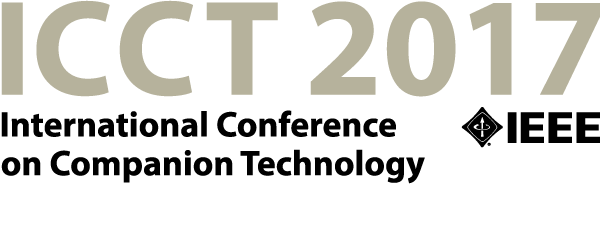Companion Technology is an emerging field of cross-disciplinary research that aims at a paradigm shift in human-technology interaction. It enables technical systems of any kind to smartly adapt their services to the individual needs of users, their current requests, situation, emotion, and disposition. Companion Technology covers and combines trans-disciplinary research in fields such as computer science and artificial intelligence, cognitive science, engineering, psychology, and neurobiology. Its application areas include digital assistance, cognitive robotics, health and elderly care, intelligent environments and homes as well as driver assistance and autonomous driving.
Under the technical sponsorship of the IEEE Systems, Man, and Cybernetics Society (IEEE-SMCS), the 2nd International Conference on Companion Technology (ICCT) will be held in Ulm, Germany, from September 11 to 13, 2017. The format of ICCT 2017 involves a single-track oral paper presentation session as well as poster sessions where each poster paper is orally presented in a short-paper session. All accepted papers will be included in the proceedings of ICCT 2017 that will be published by the IEEE Computer Society and will also appear in the IEEE Digital Library. At least one author of each accepted paper is required to attend the conference and present the work.
The Conference invites submissions of original technical papers on all aspects of Companion Technology. Papers reporting on trans-disciplinary work or on the combination and integration of methods are particularly welcome. Topics of interest include, but are not limited to:
Under the technical sponsorship of the IEEE Systems, Man, and Cybernetics Society (IEEE-SMCS), the 2nd International Conference on Companion Technology (ICCT) will be held in Ulm, Germany, from September 11 to 13, 2017. The format of ICCT 2017 involves a single-track oral paper presentation session as well as poster sessions where each poster paper is orally presented in a short-paper session. All accepted papers will be included in the proceedings of ICCT 2017 that will be published by the IEEE Computer Society and will also appear in the IEEE Digital Library. At least one author of each accepted paper is required to attend the conference and present the work.
The Conference invites submissions of original technical papers on all aspects of Companion Technology. Papers reporting on trans-disciplinary work or on the combination and integration of methods are particularly welcome. Topics of interest include, but are not limited to:
- Affective computing
- Applications of Companion Technology
- Decision making in biological and technical systems
- Cognitive neuroscience of human social behavior
- Computational models of cognitive processes
- Cooperative and adaptive systems
- Emotion and disposition modelling
- Environment perception and modelling
- Human-Aware Artificial Intelligence
- Knowledge-based dialogue management
- Knowledge-based human-computer interaction
- Multimodal emotion, disposition, and motivation recognition
- Multimodal stress and pain recognition
- Neural mechanisms of decision-making, emotion and cognition
- Reasoning for adaptive systems
- Strategy change and reversal learning
- User-centered and mixed-initiative planning
Invited Talks
Keynotes
Klaus Bengler
Intelligent Machines – Intelligent Humans
Who Changes Whom
Intelligent Machines – Intelligent Humans
Who Changes Whom
Chair of Ergonomics, Technical University Munich, Germany
Julia Hirschberg
Prosodic Entrainment and Social Impact
Prosodic Entrainment and Social Impact
Spoken Language Processing Group, Columbia University, NY, USA
Louis-Philippe Morency
Modeling Human Communication Dynamics
Modeling Human Communication Dynamics
Language Technology Institute, Carnegie Mellon University, Pittsburgh PA, USA
Trends & Challenges
Joachim Hertzberg
Challenges in Cognition-Based Human-Robot Collaboration
Challenges in Cognition-Based Human-Robot Collaboration
Osnabrück University and DFKI Robotics Innovation Center, Osnabrück Branch, Germany
Jochem W. Rieger
Towards Human State Assessment for
Cooperative Human-Cyber-Physical Systems
Towards Human State Assessment for
Cooperative Human-Cyber-Physical Systems
Applied Neurocognitive Psychology Lab, University of Oldenburg, Germany
Adrian Stoica
Trends in Applications of Companion Technology to Space Exploration
Trends in Applications of Companion Technology to Space Exploration
NASA Jet Propulsion Laboratory and California Institute of Technology, Pasadena, CA, USA
Industry Talks
Stas Krupenia
Adaptive User Interfaces: From Vehicle Components to Transport Networks
Adaptive User Interfaces: From Vehicle Components to Transport Networks
Styling and Vehicle Ergonomics, Scania CV AB, Södertälje, Sweden
Key Dates
Technical Paper submission:
May 19, 2017
Notification of Acceptance:
July 7, 2017
Camera Ready Version:
August 4, 2017
May 19, 2017
Notification of Acceptance:
July 7, 2017
Camera Ready Version:
August 4, 2017
Position Paper Submission:
July 15, 2017
Position Paper Notification:
July 31, 2017
Camera Ready Version:
August 15, 2017
July 15, 2017
Position Paper Notification:
July 31, 2017
Camera Ready Version:
August 15, 2017
Conference:
September 11-13, 2017
September 11-13, 2017
Previous Conferences:
ISCT 2015 – International Symposium on Companion Technology
ISCT 2015 – International Symposium on Companion Technology
